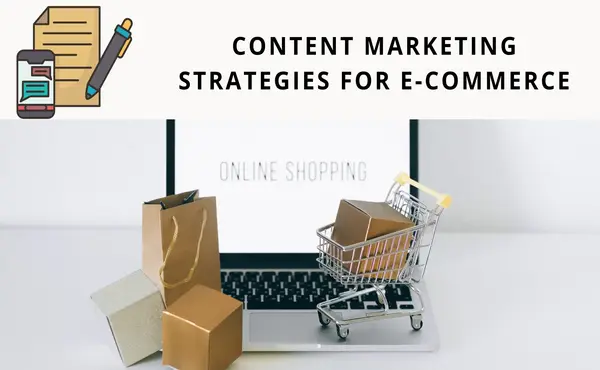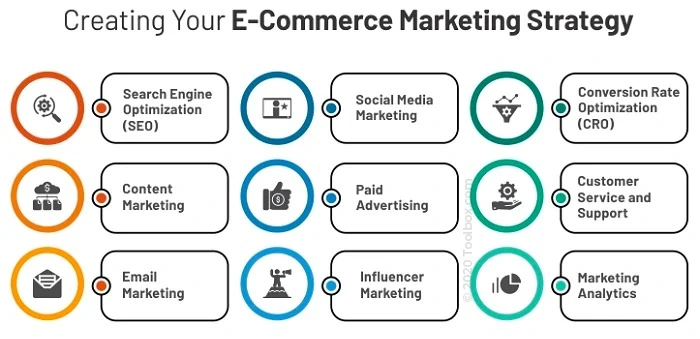
Ecommerce content marketing has become an important component for businesses on the internet looking to attract, engage, and convert customers. By using quality content, ecommerce businesses may increase trust, brand awareness, and income. This post explores some of the most effective ecommerce content marketing strategies, supported by recent statistics and insights.
What is ecommerce content marketing?
E-commerce content marketing focuses on helping customers through the buying process in order to increase online sales. A successful strategy integrates valuable content throughout the customer journey, providing potential buyers have access to the information they require at any time and through the right medium.
Content for ecommerce websites is defined by the value it provides to its target audience. Here are some examples of how ecommerce content may be valuable:
- Video guides about how products work
- High-quality images of products
- Online forums for getting answers to questions
- Search engine-optimized blog posts about issues of interest to buyers
Importance of Content Marketing in Ecommerce
Content marketing is no longer an option; it is a necessity. According to Business Advisor, 90% of marketers integrate content into their marketing plans, showing its importance in connecting with customers to build brand identity. This strategy goes beyond standard advertising to create valuable, relevant content to attract and maintain a target audience.
Key Statistics
Ecommerce Market Growth: The ecommerce market will reach $5.5 trillion in 2024, with predictions of $7.3 trillion by 2025. This growth is driven by developing digital usage and consumer confidence in online buying.
Content Marketing ROI: Businesses that focus on content marketing have a large return on investment. When 96% of ecommerce and retail businesses satisfy their content marketing goals, they achieve good results.
Mobile Commerce: Mobile commerce is an important part of the ecommerce boom, accounting for 20.4% of worldwide retail sales by 2023. This figure will climb to 24% by 2026.
Social Media Influence: Nine out of ten B2B marketers use social media platforms to deliver content, making it an important tool for reaching potential customers.
Effective Ecommerce Content Marketing Strategies

High-Quality Visual Content
High-quality images and videos are important for showing products in their best light. Detailed, clear images help potential buyers in understanding product features and making informed purchasing decisions. According to MDG Advertising study, 67% of buyers consider product image quality to be "very important" when selecting and purchasing a product. Furthermore, videos are extremely successful; studies show that product videos can increase purchases by 144%.
SEO-Optimized Blog Posts
Blogging is an excellent method for ecommerce content marketing. Online retailers may increase organic traffic and search engine rankings by writing SEO-optimized blog content. It's important to focus on topics that solve client concerns and provide useful information. For example, a blog post like "Top 10 Tips for Choosing the Perfect Running Shoes" can direct traffic to an online store that sells sports footwear. According to HubSpot, businesses that blog have 55% more website visitors than those that do not.
Email Marketing
Email marketing remains an important part of ecommerce content marketing. By sending personalized emails, businesses can nurture leads, drive repeat purchases, and increase customer loyalty. Email campaigns may offer discounts, product recommendations, and personalized content based on customer behavior. According to Campaign Monitor, for every $1 spent on email marketing, the average return on investment is $44.
Influencer Partnerships
Collaboration with influencers is another successful ecommerce content marketing strategy. Influencers have built trust with their following and may provide genuine content that sells items in a relatable way. For example, a beauty influencer can show their audience the benefits of a new skincare product. According to Influencer Marketing Hub, businesses gain an average of $5.20 for every $1 invested in influencer marketing.
Interactive Content
Interactive content, such as quizzes, polls, and calculators, engages customers and improves their buying experience. For example, a quiz titled "Which Running Shoe Is Right for You?" may help buyers in finding the ideal product while also providing important information about brand preferences. According to the Content Marketing Institute, 81% of marketers believe that interactive content attracts attention better than static content.
Using 360 Marketing Tool for Ecommerce Content Marketing
360 Marketing Tool provides a complete solution for SEO, PPC, email marketing, keyword research, content insights and backlinks content. By adding this technology into your ecommerce content marketing plan, you can streamline your efforts and get greater results. The tool easily identifies and integrates high-performing keywords. Helping you to improve your approach and stay ahead of the competition.
Conclusion
Ecommerce content marketing is a dynamic and ever-changing area, with methods that have a big impact on a brand’s success. Ecommerce businesses may effectively engage and drive sales by using high-quality visual content, SEO-optimized blog posts, email marketing, influencer relationships, and interactive content. As the ecommerce business expands, keeping up with the newest trends and statistics is important for keeping a competitive advantage. Businesses can improve their content marketing efforts and results by using solutions such as 360 Marketing Tool. If you want to learn content marketing and SEO strategies check out our blog Content Marketing and SEO Strategies for Business Growth
What to read next
.webp)
